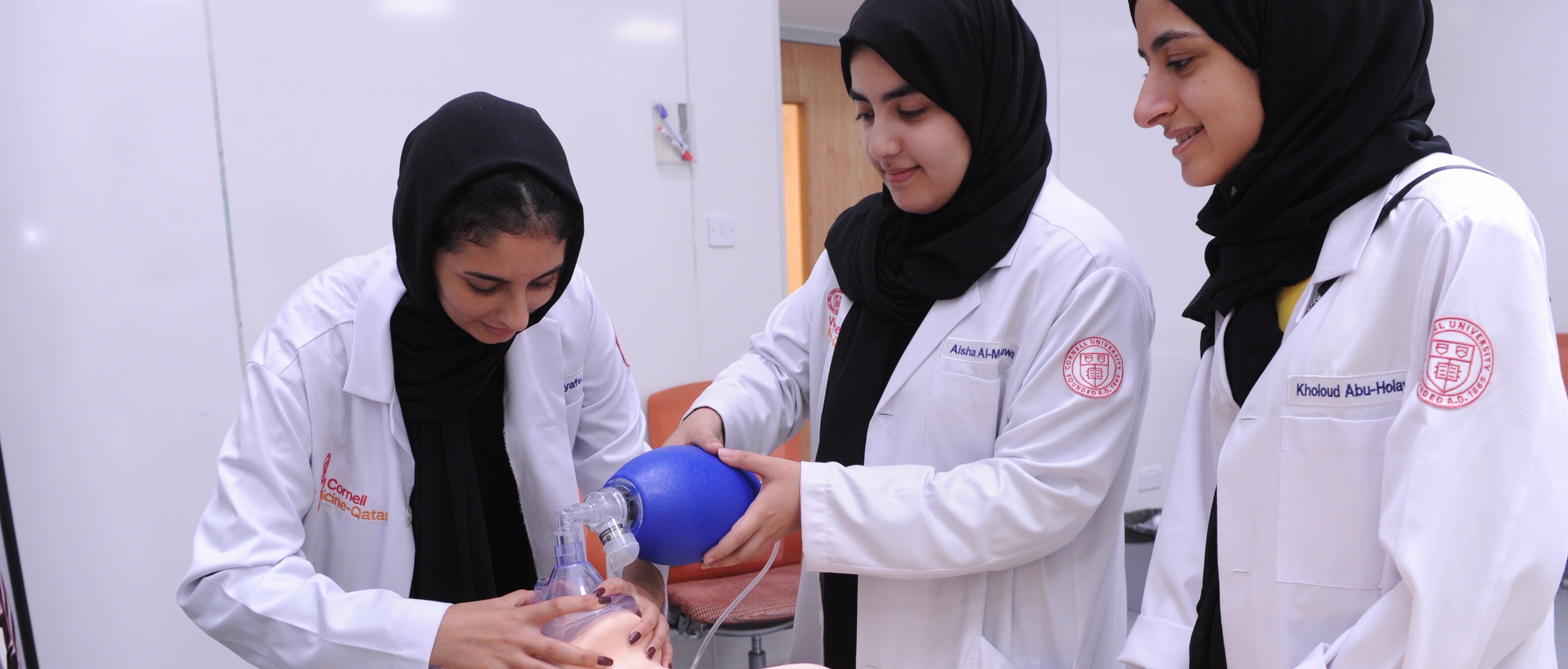First-year students learn vital first responder skills
 First-year students get to grips with a bag-valve mask ventilator.
First-year students get to grips with a bag-valve mask ventilator.
First-year medical students at Weill Cornell Medicine-Qatar (WCM-Q) took their first steps towards attaining the core practical skills of doctors as they completed a day of First Responder training at the college.
Guided by visiting Emergency Medicine professionals from Hamad Medical Corporation (HMC), the students received training in key practical First Responder skills, such as delivering artificial respiration, immobilizing a patient, applying dressings, slings and splints, and using artificial external defibrillator (AED) machines.
The Emergency First Responder Course is something of a milestone for WCM-Q first-year medical students as it presents one of the first opportunities for putting into practice the theoretical knowledge of medicine they have learned thus far.
On the course, students rotated through five stations. At the airway bag station, Dr. Ram Kumar, HMC Emergency Medicine Fellow, used medical mannequins to demonstrate how to open a patients’ airway and then keep it open using an instrument called an airway adjunct. They also learned how to use a bag-valve mask (BVM) ventilator and to clear an airway using a portable suction device.

At the immobilization station, Dr. Ashwin D. Silvia, HMC Associate Consultant in Emergency Medicine, worked with a standardized patient – an actor playing the role of a patient – to train the students to apply a pelvic binder and to safely transfer a patient onto a scoop stretcher for evacuation. Meanwhile, Dr. Omar Al-Baroodi, HMC Emergency Medicine Resident, used standardized patients to show students how to apply splints, bandages and arm slings and to demonstrate the use of a spinal board. Dr. Hany Kamel, HMC Associate Consultant in Emergency Medicine, led the case scenarios station, in which students brainstormed responses to medical emergencies such as a seizure or a patient going into anaphylactic shock. Dr. Zahra Makki, who completed the Pre-medical Program at WCM-Q, used her station to show students how to use the AED machine.
Dr. Makki, who then went on to graduate from a medical program in Bahrain, is now a Resident in the Emergency Department at HMC. She said: “It has been great to return to WCM-Q to pass on some of the knowledge I have gained. The students were extremely bright, enthusiastic and accomplished so it has been a great day of learning.”
First-year WCM-Q student Basem Ali said: “It has been great to move from lectures and textbooks to getting hands-on and learning some practical skills. All of us are studying medicine because we want to help people and in emergency situations you get to do that in a very immediate way, so this course has been very gratifying.”
Dr. Stella Major, WCM-Q’s Associate Professor of Family Medicine in Clinical Medicine and Director of the Clinical Skills and Simulation Lab, said: It was impressive seeing how eager the students were to engage and learn from the emergency medicine physicians from HMC. They valued learning many new skills, under expert guidance and appreciated having access to all the best teaching aids, task trainers, simulators and simulated patients, which are provided to them through the Clinical Skills and Simulation Lab at WCM-Q. This course provides them with the basic foundations of how to respond safely to medical emergencies outside the hospital setting.”
